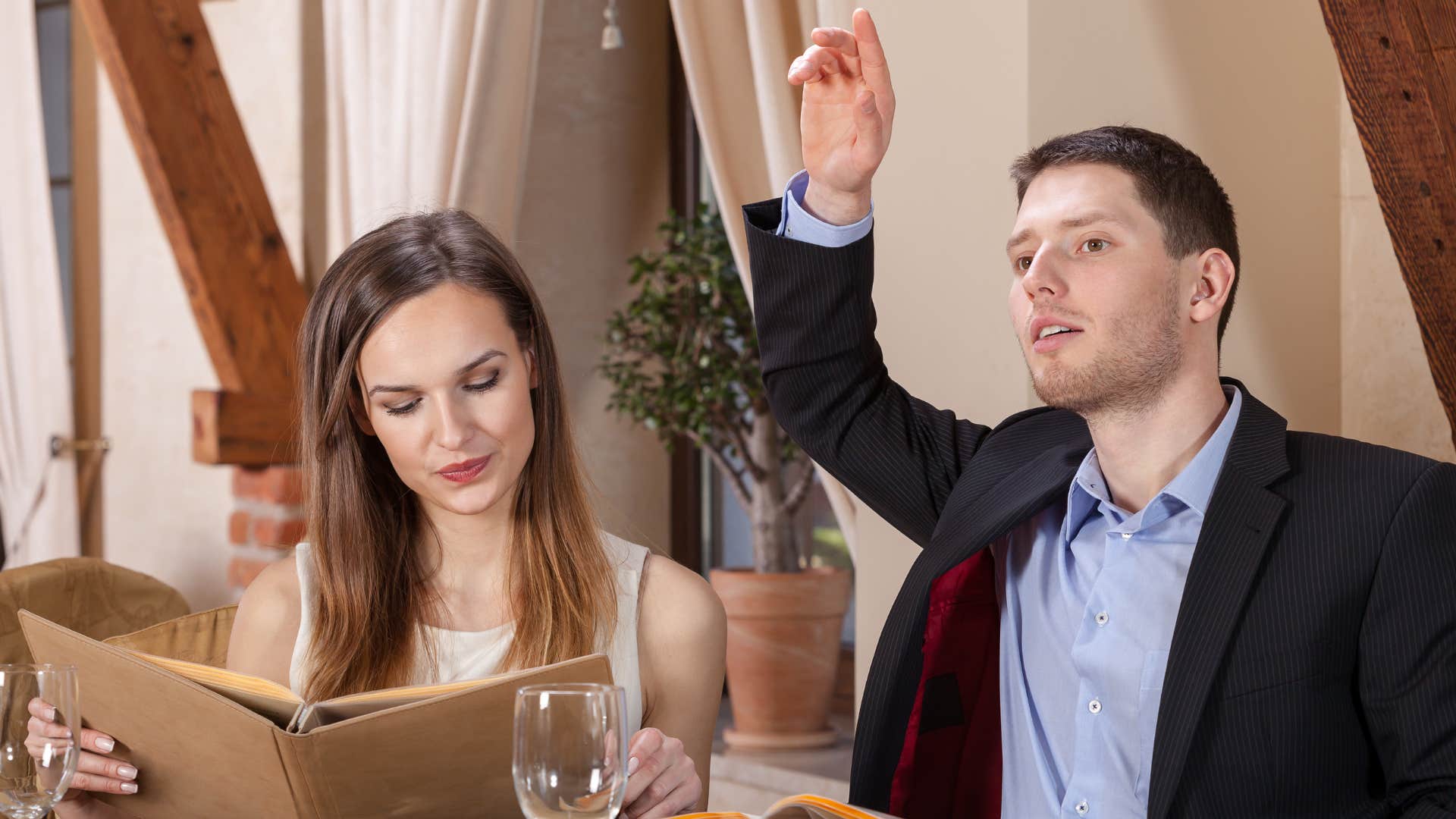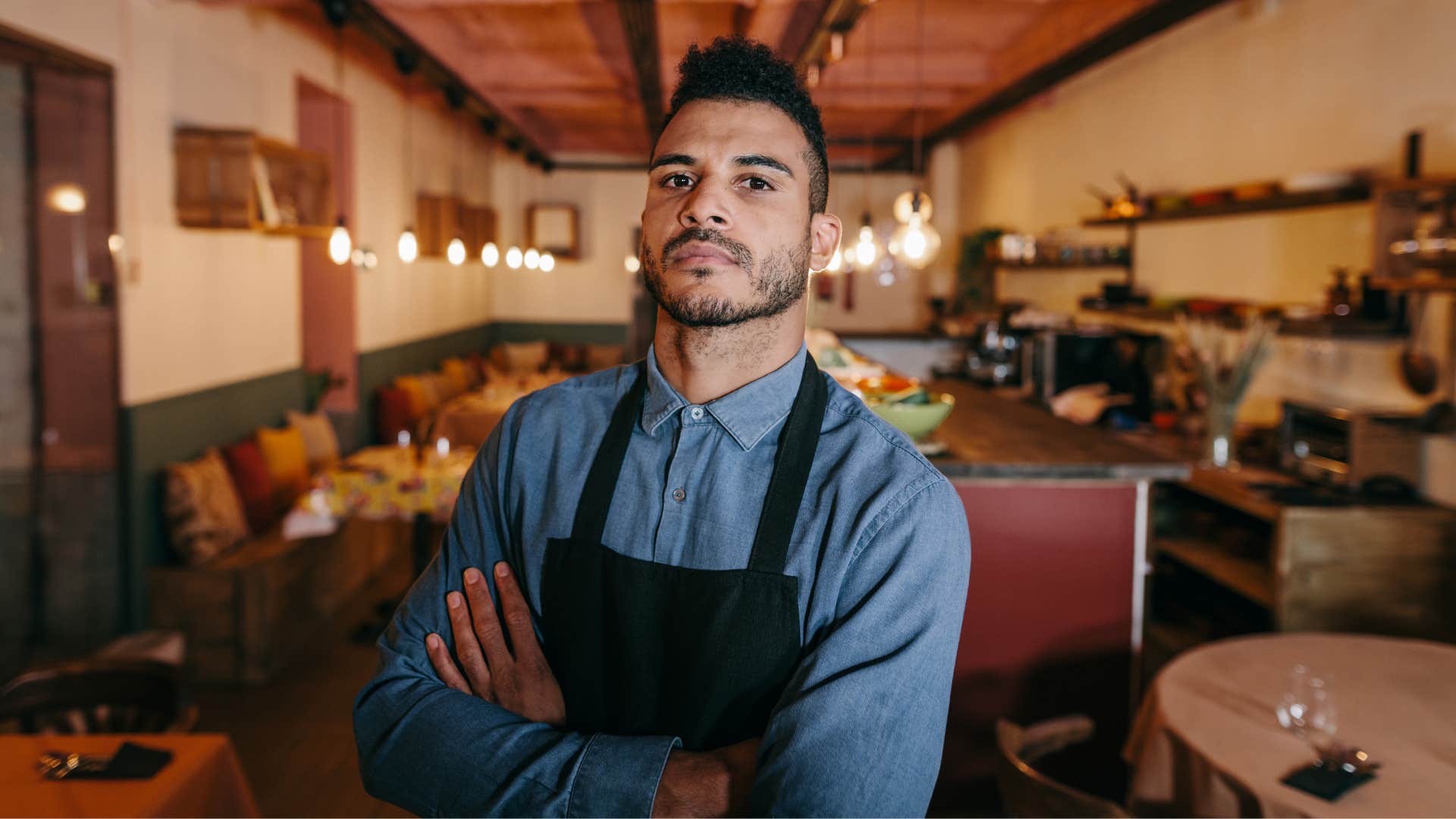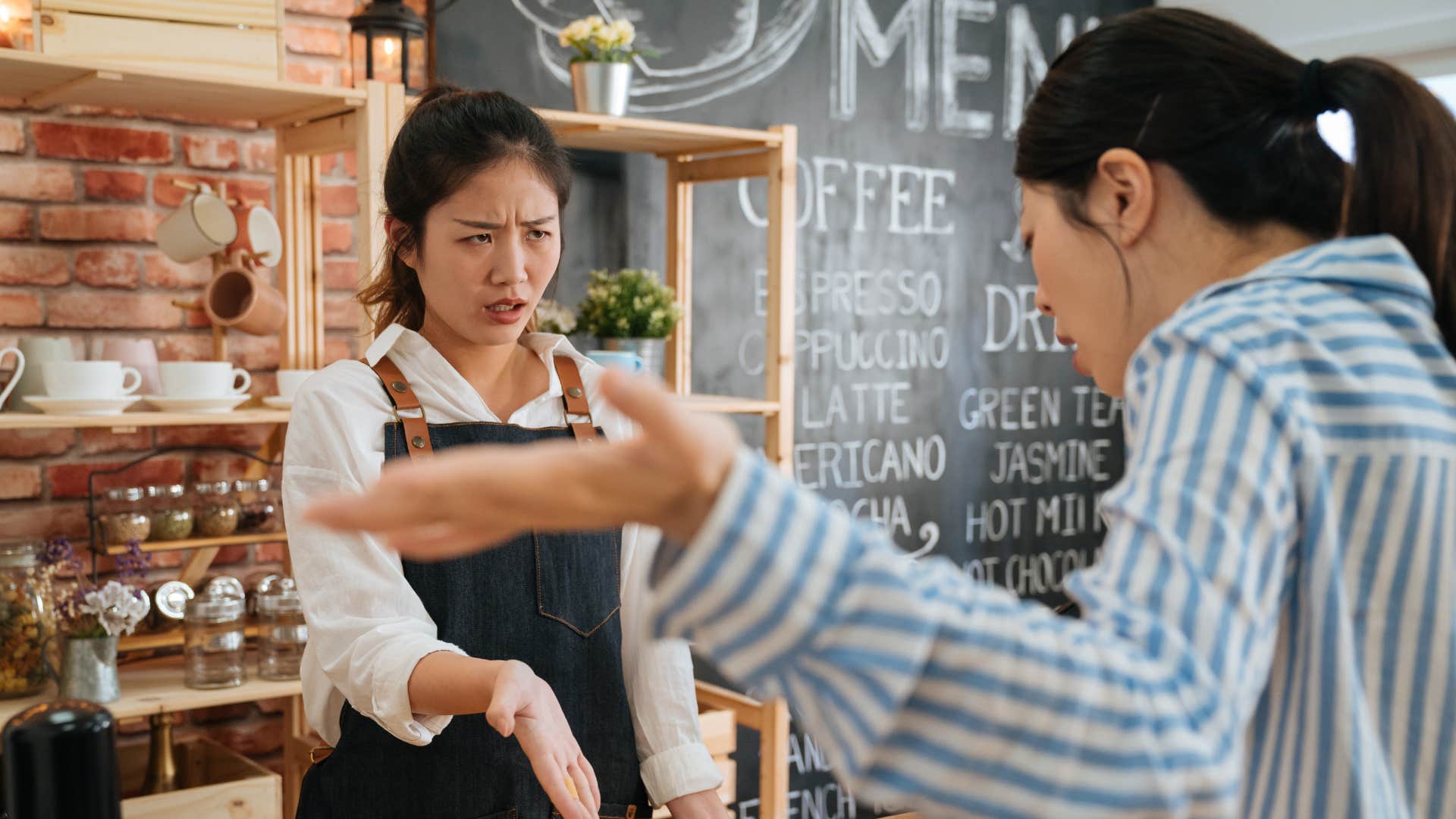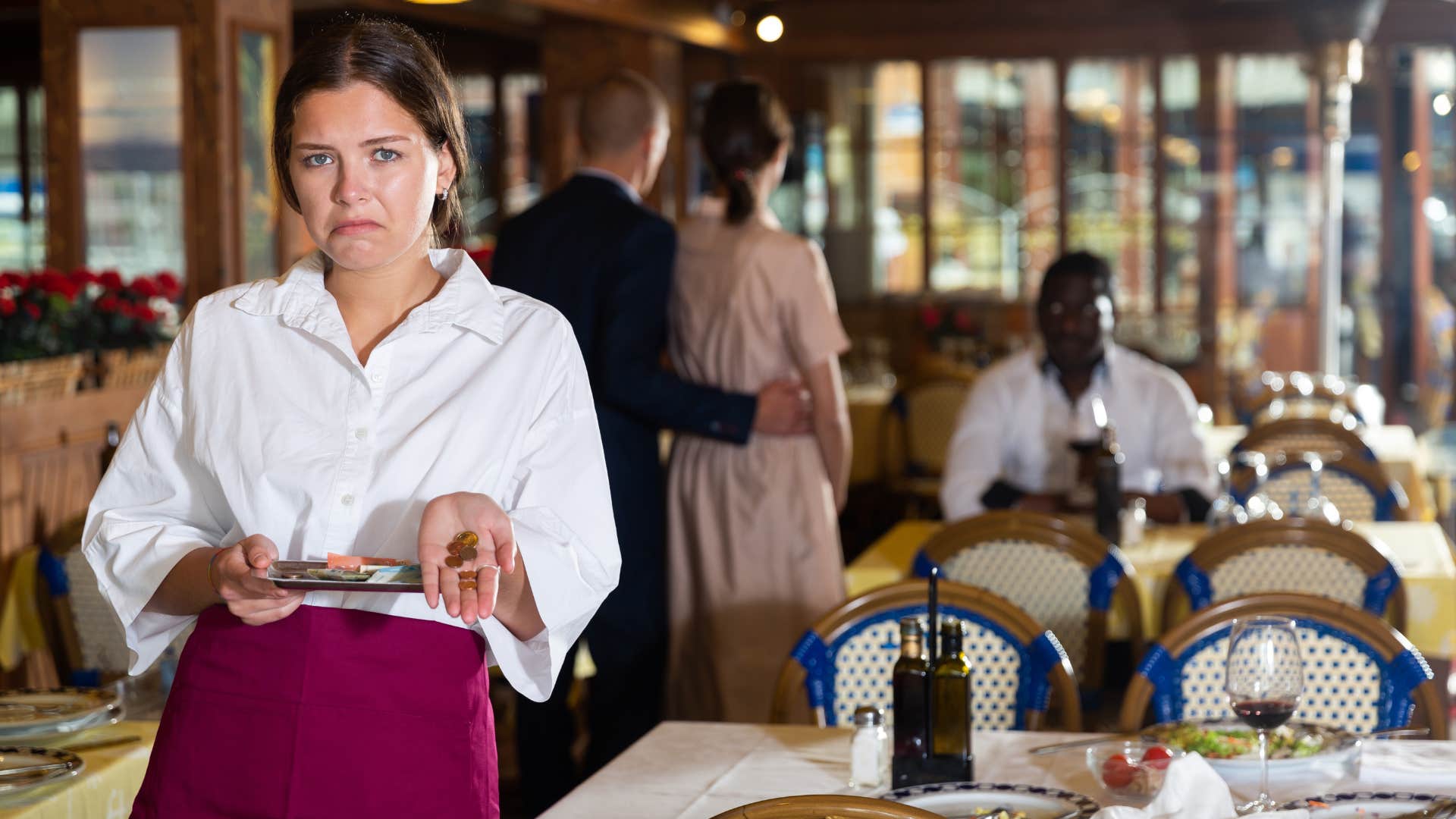6 Phrases People Use With Waitstaff That Instantly Give Away Their Lack Of Social Intelligence
We aren't judging, but the restaurant employees are.
 Estrada Anton | Shutterstock
Estrada Anton | Shutterstock Sometimes when eating out, people can be inconsiderate to the point of being ridiculous. Often, this comes from a lack of insight into what it is like on the other side. In this case, it is the other side of the table at a restaurant
There are restaurant customers who have no clue what being a server is like. Waitstaff need to multitask, prioritize, be kind, smile, listen actively, anticipate needs, and do it fast. All while earning less than minimum wage and depending on tips to survive.
Here are six phrases people use with waitstaff that instantly give away their lack of social intelligence:
1. 'Sweetheart, honey,' or any other objectifying term
 Monkey Business Images via Shutterstock
Monkey Business Images via Shutterstock
Therapist Dr. Gloria Brame realizes someone could write a whole book about the uncivil and arrogant things people say to servers, retail clerks, and customer service workers daily. All the phrases reveal varying degrees of a lack of social intelligence.
You cross boundaries when you call an unfamiliar server "sweetheart," "honey," or other endearments. This is their workplace, and being objectified isn't in their job description. The worst offenders escalate this by openly flirting, putting servers in the super-awkward position of having to smile through it because they depend on tips.
"Hey, sweetheart," Nope, not sweet, no hearts for you.
2. 'Hey, you'
 Ground Picture via Shutterstock
Ground Picture via Shutterstock
Dr. Brame continues, some restaurant customers treat waitstaff like personal servants. They order them around, make jokes at their expense, and know the server will put up with their disrespect for the sake of a tip.
This is directly connected to the racist history of tipping in the USA, as explained by the Shriver Center on Poverty Law. "Tipping proliferated in the United States after the Civil War, when the restaurant and hospitality industries hired newly emancipated Black women and men but offered them no wage, leaving them to rely on patrons’ gratuities for their pay instead. Simply put, tipping was introduced as a way to exploit the labor of former slaves."
"Hey, you!" No, you are mistaken, not me at all.
3. 'Do you know who I am?"
 Estrada Anton via Shutterstock
Estrada Anton via Shutterstock
Dr. Brame adds one more. People who say "Do you know who I am?!" are the most clueless of all. These customers try to intimidate servers by yelling, name-dropping real and imaginary connections (mostly imaginary), or threatening to get them fired. It is disturbingly anti-social.
People with high social intelligence treat service workers the same way they treat other professionals: with basic respect and courtesy. Social intelligence isn't about our social status; it's about our humanity toward one another.
"Do you know who I am?" Yes, a customer is about to get the bare minimum of service with a grimace.
4. 'What's your name?'
 Basilico Studio Stock via Shutterstock
Basilico Studio Stock via Shutterstock
'What's your name in case I need to get your attention,' is something counselor Larry Michel has heard used far too often. The customer might think they are being preemptive, but in reality, they are setting up self self-fulfilling prophecy.
Expecting to have to get the waitstaff's attention by shouting out their name often indicates the patron has had poor service in the past, usually due to their rude behavior toward the staff. Thus, the customer expects poor service from every service worker. So instead of accepting that the wait staff are capable of doing the job they have, the customer projects an expectation of poor service, which is why they get less than attentive service. The waitstaff knows there will be no pleasing them.
"What's your name?" Oh, you can just wait to find out.
5. 'Could you hurry up?'
 PR Image Factory via Shutterstock
PR Image Factory via Shutterstock
No matter the phrase, using a classically classist tone is never okay. It's all in the tone of voice because some people are unable to treat waitstaff as full-fledged human beings, observes life coach Susan Allan. Conversely, those who grew up to treat staff as equals who had jobs to do, upon which they depended, know better.
So, it's a question of experiencing tremendous gratitude for people who do things you need done and do not wish to do yourself, and that includes the waitstaff, cleaners, and everybody else in the service industry.
"Could you hurry up?" Why, no, no, I can't.
6. 'Your tip depends on your performance'
 BearFotos via Shutterstock
BearFotos via Shutterstock
Then, after saying that, they put a stack of dollar bills on the table a gave either a slight glare or a crooked grin, explains editor Aria Gmitter. Nothing says "I lack social intelligence" like a person who goes to a restaurant and makes it clear they do not plan to tip based on the bill's total, but instead on their definition of quality service.
Some people love to be rude to servers, and when I worked in food service, there was a man who would place a stack of dollar bills on the table and say, "Your tip depends on how happy I am with your service."
The moment his rear hit the seat, the clock was ticking, and if he was unhappy about how long it took for a person to bring him the menu or fill his water glass, he'd take away several dollar bills. He called it incentivizing. The staff would call it another word.
Everything about him made it hard to feel good about taking care of his table. His attitude, body language, and words were so negative. I wish he were the only person I've seen doing this. I have seen people putting pennies on a table under a glass of water with it upside down!
Approaching the dining table with an "all-about-me" mindset is unappetizing. Yes, a server's tip is a gratuity. But it's just rude to tell someone how to do their job by degrading them. And, if you're stuck sitting at a table with someone like this, you feel embarrassed that you're associated with a louse.
"You're tip depends," and so does your service. When a customer drops any of these often-heard phrases or their like, they set off a chain reaction. The waitstaff flags them as a difficult person. If they are dining with someone else, that person is likely cringing inside at their companion's behavior.
After walking away from the table, the waitstaff will inform the kitchen staff because "Difficult customer." The kitchen staff then have to make extra sure the meal is prepared perfectly, otherwise it is likely to get sent back. Great, now everyone from the person across the table to the front and back of the restaurant knows there is another person with low social intelligence dining in. This meal might be made perfectly, but it won't be made or served with love. Wait a minute. It must be Tuesday.
Will Curtis is YourTango's expert editor. Will has over 14 years of experience as an editor covering relationships, spirituality, and human interest topics.

